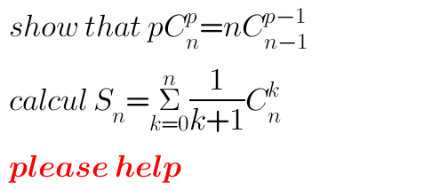
AllQuestion and Answers: Page 239
Question Number 198311 Answers: 0 Comments: 0
Question Number 198309 Answers: 0 Comments: 2

Question Number 198304 Answers: 0 Comments: 7
Question Number 198302 Answers: 1 Comments: 0

Question Number 198296 Answers: 0 Comments: 0
Question Number 198295 Answers: 1 Comments: 0
Question Number 198293 Answers: 1 Comments: 0

Question Number 198267 Answers: 3 Comments: 0
$${Find}\:{the}\:{real}\:{values}\:{of}\:{n}:\:{n}^{\mathrm{6}} −{n}^{\mathrm{3}} =\mathrm{2} \\ $$
Question Number 198266 Answers: 1 Comments: 0

Question Number 198263 Answers: 1 Comments: 0

Question Number 198260 Answers: 0 Comments: 0
Question Number 198252 Answers: 1 Comments: 2

Question Number 198249 Answers: 1 Comments: 4
Question Number 198246 Answers: 0 Comments: 0
Question Number 198244 Answers: 0 Comments: 0

Question Number 198243 Answers: 3 Comments: 0
Question Number 198242 Answers: 1 Comments: 3
Question Number 198241 Answers: 1 Comments: 0

Question Number 198237 Answers: 1 Comments: 0
Question Number 198235 Answers: 1 Comments: 0

Question Number 198269 Answers: 1 Comments: 0
$${calcul} \\ $$$$\underset{{k}={o}} {\overset{{n}} {\sum}}{sin}\left({k}\right) \\ $$
Question Number 198232 Answers: 1 Comments: 0
$${find}\: \\ $$$$\underset{{k}={o}} {\overset{{n}} {\sum}}{sin}\left({k}\right) \\ $$
Question Number 198231 Answers: 1 Comments: 0

Question Number 198228 Answers: 1 Comments: 0
Question Number 198222 Answers: 1 Comments: 1
Question Number 198210 Answers: 1 Comments: 1
$$\:\boldsymbol{\mathrm{Red}}\:\boldsymbol{\mathrm{Area}}? \\ $$
Pg 234 Pg 235 Pg 236 Pg 237 Pg 238 Pg 239 Pg 240 Pg 241 Pg 242 Pg 243
